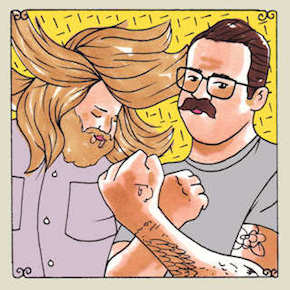
There is, in fact, no BuzzFeed quiz for “Which Son in the Parable of the Prodigal Son Are You?”—and if there were, I’m not sure people would take it.
As the story goes, a decently well-off man has two not-that-decent sons. The younger, wild and fugitive, asks his father for an advance on his inheritance. (I have never been a first-century householder or the offspring of one, but have heard this would effectively send the message “You’re dead to me” from son to father.) The father (again, nothing like me, because I would have laughed at this kid or sent him to his room or corner or whatever they had back then) actually complies with his son’s request, cuts the property between this son and his anal-retentive brother, and blesses him on his way to live a life of reckless carousing in a foreign country. (Sounds like an early version of “study abroad” to me.)
Well, the kid gets tired of carousing–or maybe he runs out of money first and then realizes he’s up an unfamiliar creek without the proper utensil–and winds up “pissed and miserable” (to borrow a phrase from DFW), feeding somebody else’s pigs to earn his keep. Apparently this “keep” is so inadequate—or maybe it’s just gross to him, like they’re offering him chocolate-covered crickets, which is quite the thing in Mexico—that he wants to eat the pigs’ food. At this point he realizes, “Well, damn! My dad’s employees eat better than this. Maybe I’ll go back and beg to work for him.” All this is with the just expectation that the father will say, “You were an idiot,” “No, you can’t work for me,” or worst of all (but to be expected, given that the kid has bought his way out of the family), “You’re not even my son anymore. Why are you here?”
But the father does none of this. Instead, the moment he sees the gaunt silhouette of what used to be his son on the horizon, he bolts from his rocking chair crying tears of joy as he runs and tackles the startled runaway with kisses. The gesture doesn’t sink in with the kid, who still gets down and, planning to beg for a low position working for (what he thinks is) his ex-dad just to be able to buy bread, says “I’m not worthy to be called your son.” To the-ex son’s shock, his old man calls up the people who actually do work for him and arranges a welcome-home rager for his son. And he keeps referring to him as “son,” making it clear that even the role he abdicated he can have back—and more.
Naturally, when the other son—the “good” one, who stayed—comes home after a long day of work and hears the rager and sees the strobe lights outside the house, he’s confused. And when he finds out who it’s for, he gets pissed. Pissed and miserable like his brother was when “study abroad” went south—only kind of different, because he never even got to study abroad, nor did he ever have a rager thrown in his honor after making a total fool of himself. In fact, as he tells his father in a jealous outburst, “I’ve worked like a slave for you and you NEVER. EVEN. GAVE. ME. A. GOAT!” (Why he wants a goat is open to interpretation.)
The father (who we are coming to learn is abnormally kind and level-headed) responds to his older son’s vicious anger in the exact same way he’s responded to his younger son’s kamikaze adventure and boomerang back home: by affirming his basic son-ness. “Son,” he says, “you are always with me, and all that is mine is yours.” The subtext of this comment, I think, is: “If you want a rager too, you can have one next weekend—but come enjoy this one first.” (Even though you’re acting like a fool, too. Even though half my money is gone.) Apparently this father is richer than anyone ever knew.
Back to the BuzzFeed quiz. I don’t think anyone would take it because, in my experience, most everyone to whom this story means something already consciously identifies with one son or the other. We think we’re either the crazy, reckless one whom a good father (God) could never take back (but does), or we’re the law-abiding, hard-working one who’s unable to appreciate grace when grace throws a party for an overt sinner.
It wasn’t until I heard the pairing of Penny & Sparrow’s “Thunder” and “Honest Wage”—which come back-to-back on their 2014 album Struggle Pretty—that I realized I could consciously identify as both. That this might even be welcome, might even be true of everybody in that we all contain the basic tendencies of both the one who feels the need to fly from home and the one who’s trying his best at home, when really he’s enslaved to a self-taught and self-enforced idea of what that means (under the Law in the worst of ways).
On first listen, most of Penny & Sparrow’s songs could be about any flavor of broken love. There are songs about love for the cheating wife, love of someone who’s dying for someone else who’s also dying, love between brothers, the love of Jean Valjean for Cosette, love almost stamped out by domestic discord, and love for someone who’s just wearing a black dress. (If you want to know why almost everything’s a love song, read Adam Gopnik’s thought-provoking essay for the New Yorker here.)
But in a number of these songs, there’s a second layer resonant with something divine, transcendent—true not only of a lover but the Lover. “Thunder” and “Honest Wage” are songs to this tune: could be about anybody, but with that extra layer, they become heart-wrenchingly relatable accounts of the old parable from the perspective of each brother.
Upbeat and full of younger-brother energy, “Thunder” could be about anyone who’s ever run from the love they had at home because they’re bored, or their heart is empty and vagrant, and they don’t know what they want.
(This live version starts at :40 and is much slower than the album version, but it conveys a deeper sense of the sadness behind the lyric. Stairwell harmonies are fun, too.)
“All I’ve got is thunder,” the final chorus goes, “noise with nothing after / and if I can’t have you, then I’m probably through / cause all I’ve got is thunder.”
The perspective transcends situational boundaries and, again, could be anyone’s tune, but a few lines give away the specificity of a father-son relationship—and in particular the Father-to-Prodigal relationship. “I think ‘This must be it, you must be tired of my shit’ / but then you’re in the driveway holding me!” and “I can’t help it, I’m crying through my party,” to name a few, betray a Luke 15 undercurrent that carries us into the next song.
Slow and brooding with the older brother’s anger, “Honest Wage” tells the story of a jealous lover caught in what he perceives to be a love triangle and choking on his own sense of fairness. Repeated over and over until it crescendoes into an ending, the singer’s croon is: “I wish it was easier to kiss you on the mouth, / like it is to work hard and earn and honest wage. / But you’re not always fair to me, like I wish you would / be. He’s the one who left home, and I’m the one who / stayed.”
I don’t need to be taught what it means to run because the outside is calling, nor do I need to be taught what it’s like to be jealous for someone’s love, and that’s why I can sing along to both these songs regardless of what the artist might mean by them. But when they take on the old, old story—that I have fled and do flee a Lover (“daily pack a bag and leave,” as Penny & Sparrow puts it), and that this Lover consistently welcomes me home and still invites me to his parties—that is when these songs wind up on my life’s mixtape. That’s when they come to define not just a season of life but color a lifetime’s worth of both running and staying. And I don’t think that cassette is coming out of the tapedeck in my old car anytime soon; in fact, I think it might be stuck.

COMMENTS
Leave a Reply














